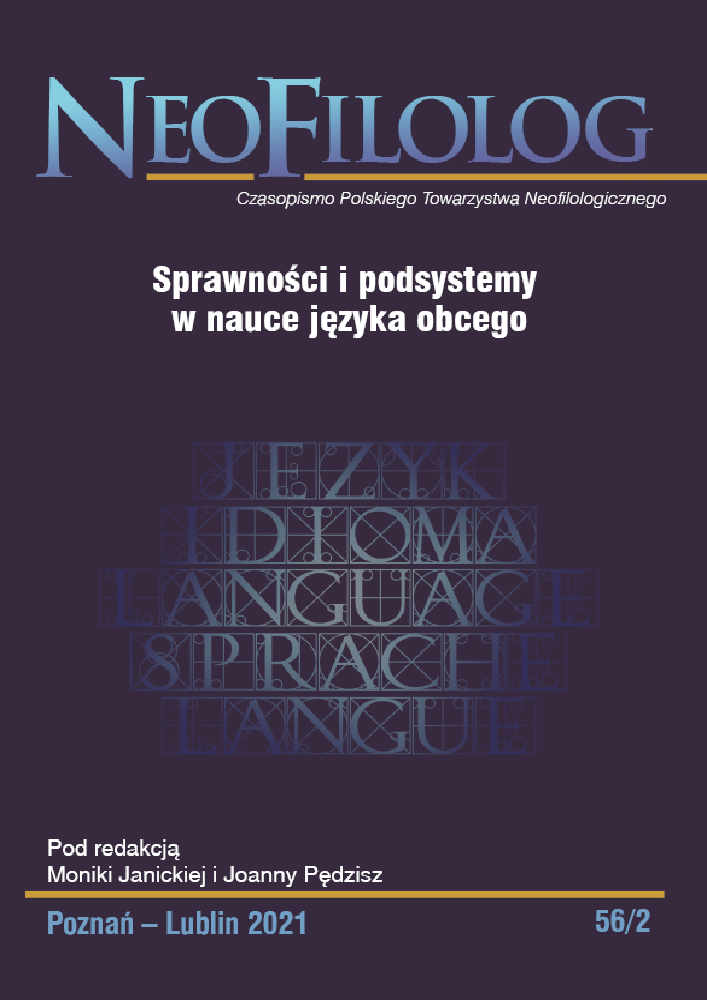Abstract
The article presents a study conducted on 27 university students and 5 of their teachers in the Winter semester 2020/21. The study was conducted because of recommended online teaching at Polish universities and almost four decades after the first TED event, when the TED community has become worldwide and the recordings of the events can be accessed online cost-free by anybody. The popularity of TEDs and the need to teach online prompted the author to incorporate it in teaching practice and review research literature from the areas of SLA (Second Language Acquisition), EFL (English as a Foreign Language) teaching and learning, socio-constructivism and adult learning. Based on this review, a hypothesis was formulated: TED talks support the development of listening, speaking, and interaction skills when used as a supplementary resource in teaching English as a foreign language to university students. Three supplementary questions were formed to test the hypothesis. Data was obtained in an online questionnaire and analysed using the qualitative data analysis framework of Miles and Huberman (1994). The study confirmed the hypothesis. Lessons with TEDs are valued as varied, interesting, inspiring and supporting oral communication skills’ development. Results are discussed, conclusions drawn and further research explored.
Literaturhinweise
Aleksandrzak M. (2018), Rozwijanie sprawności mówienia w kształceniu neofilologicznym z perspektywy studentów uczących się języka angielskiego jako obcego. Badanie jakościowe. Poznan: Wydawnictwo Naukowe UAM.
Bandura A. (1971), Social Learning Theory. New York City: General Learning Corporation. Online: https://web.archive.org/web/20131024214846/http://www.jku.at/org/content/e54521/e54528/e54529/e178059/Bandura_SocialLearningTheory_ger.pdf [DW 13.01.2021]
British Council & BBC World Service (2021), Communicative approach. Onli-ne: https://www.teachingenglish.org.uk/article/communicative-approach [DW 13.01.2021]
Council of Europe (2020), Common European Framework of Reference for Lan-guages: Learning, teaching, assessment – Companion volume, Council of Europe Publishing, Strasbourg, Online: https://www.coe.int/lang-cefr [DW 13.01.2021]
Ellis R. (2008), Principles of Instructed Second Language Acquisition. CAL Digest, December 2008. Online: Ellis, R. (2008) Principles of Instructed Second Language Acquisition [Language Learning].pdf [DW 13.01.2021]
European University Association (2020), COVID-19 and universities. Online: https://www.eua.eu/issues/27:covid-19-and-universities-in-europe.html [DW 13.01.2021]
Instytucja PAN (2021), The Code of Ethics for Research Workers. Online: https://instytucja.pan.pl/index.php/kodeks-etyki-pracownika-naukowego?jjj=1611685422342 [DW 13.01.2021]
Jaroszewska A. (2020), Studium przypadku w badaniach glottodydaktycz-nych. „Neofilolog”, Nr 54/2, 245–268. Online: https://pressto.amu.edu.pl/index.php/n/article/view/23404/22055 [DW 13.01.2021]
Jaworska M. (2020), Wyznaczniki profesjonalizmu nauczyciela – dyskusja glottodydaktyczna a polityka i praktyka oświatowa. „Neofilolog”, Nr 55/1, 51–73. Online: http://dx.doi.org/10.14746/n.2020.55.1.4 [DW 21.01.2021]
Knowles M. (1973), The adult learner: A neglected species. Houston: Gulf Publishing Company.
Komorowska H. (2009), Metodyka Nauczania Języków Obcych. Warszawa: Fraszka Edukacyjna.
Komorowska H. (2019), Ocenianie w Nauczaniu Języków Obcych. Fakty, mity i trudności. „Neofilolog”, Nr 53/2, 153–170. Online: https://pressto.amu.edu.pl/index.php/n/article/view/20579/20074 [DW 13.01.2021]
Kozinska K. (2013), Supporting lifelong learning with Open Educational Re-sources (OER) among diverse users: motivations for and approaches to learning with different OER. PhD thesis The Open University. Online: http://oro.open.ac.uk/40290/ [DW 06.01.2021]
Krashen S. (2013), The Compelling (and not just interesting) Hypothesis. Online: http://www.sdkrashen.co/onten/rticle/he_compelling_input_hypothesis.pdfGoogle Scholar [DW 22.01.2021]
Lantolf J., Thorne S. L., Poehner M. (2015). Sociocultural Theory and Second Language Development. In B. van Patten & J. Williams (Eds.), Theories in Second Language Acquisition (207–226). New York: Routledge. Online: https://www.researchgate.net/publication/313795407_Lantolf_J_Thorne_S_L_Poehner_M_2015_Sociocultural_Theory_and_Second_Language_Development_In_B_van_Patten_J_Williams_Eds_Theories_in_Second_Language_Acquisition_pp_207-226_New_York_Routledge [DW 19.03.2021]
Lindeman E. (1926), The Meaning of Adult Education. New York: New Republic, Inc.
McKinley J. (2015), Critical Argument and Writer Identity: Social Constructiv-ism as a Theoretical Framework for EFL Academic Writing. Online: https://doi.org/10.1080/15427587.2015.1060558 [DW 19.03.2021]
Miles M., Huberman A. (1994), An Expanded Sourcebook. Qualitative Data Analysis.2nd ed. London: Sage.
Paivio A. (2006), Dual Coding Theory and Education. Draft chapter for the conference on “Pathways to Literacy Achievement for High Poverty Children,” The University of Michigan School of Education, September 29–October 1, 2006. Online: https://neuropedagogie.com/images/pdf/paivio.pdf [DW 06.01.2021]
Patrick R. (2019), Comprehensible Input and Krashen’s theory. „Journal of Classics Teaching”, 20(39), 37–44. Online: https://www.cambridge.org/core/journals/journal-of-classics-teaching/article/comprehensible-input-and-krashens-theory/2308987050E8D31E3986B530D4B02F6F [DW 22.01.2021]
Punch K. (2005), Introduction to Social Research – Quantitative and Qualita-tive Approaches. London: Sage.
Richards J., Rogers T. (2001), Approaches and Methods in Language Teach-ing. Cambridge University Press: Cambridge.
Rose H., Galloway N. (2019). Global Englishes for Language Teaching. Cam-bridge: Cambridge University Press.
Serwis Rzeczypospolitej Polskiej (2020), Od 9 do 29 listopada – konieczne maksymalne przejście na naukę i pracę zdalną w uczelniach. Online: https://www.gov.pl/web/edukacja-i-nauka/od-9-do-29-listopada-konieczne-maksymalne-przejscie-na-nauke-i-prace-zdalna-w-uczelniach [DW 05.01.2021]
Swan M. (2005), Legislation by Hypothesis: the case of task-based instruction. „Applied Linguistics”, 26/3, 376–401. Online: doi:10.1093/applin/ami013 [DW 21.01.2021]
TED Conferences LLC (2021), TED Ideas worth spreading. Online: https://www.ted.com/ [DW 13.01.2021]
The University of Oxford (2020), Oxford podcasts. Online: https://podcasts.ox.ac.uk/open [DW 13.01.2021]
World Health Organization (2021), Coronavirus disease (COVID-19) pan-demic. Online: https://www.who.int/emergencies/diseases/novel-coronavirus-2019?adgroupsurvey={adgroupsurvey}&gclid=Cj0KCQiA0fr_BRDaARIsAABw4EtUyKL6zoiYKBP8k3cq05Vh5CEoATbX-q9sVYHrHHCehtbSuQ6YEqAaAqZgEALw_wcB [DW 13.01.2021]
Vygotsky L. (1978), Mind in Society. The Development of Higher Psychological Processes, Cambridge, MA: Harvard University Press.
Wiśniewska D. (2013), Interest and interest-enhancing strategies of adoles-cent EFL learners. „EFL Journal”, 67/2, 210–219.
NETOGRAPHY
https://bre.eltkeynote.com [DW 13.01.2021]
https://www.khanacademy.org/ [DW 13.01.2021]
https://www.microsoft.com/pl-pl/microsoft-teams/group-chat-software [DW 13.01.2021]
https://elt.oup.com/teachersclub/subjects/businessenglish/?cc=pl&selLangu age=pl [DW 13.01.2021)
http://www.uwm.edu.pl/badania/komisja-etyki/dokumenty [DW 13.01.2021]
https://www.youtube.com [DW 13.01.2021]
Lizenz
Copyright (c) 2021 Neofilolog

Dieses Werk steht unter der Lizenz Creative Commons Namensnennung - Keine Bearbeitungen 4.0 International.
Autoren:
Die Autoren der zur Veröffentlichung in der Zeitschrift Neofilolog angenommenen Texte sind verpflichtet, den Vertrag über die Erteilung einer kostenlosen Lizenz für die Werke mit der Verpflichtung zur Erteilung einer Sublizenz CC auszufüllen, zu unterzeichnen und an die Adresse der Redaktion zurückzusenden.
Gemäß Vertrag erteilen die Autoren auf die in der Zeitschrift Neofilolog veröffentlichten Texte der Adam-Mickiewicz-Universität in Poznań eine nicht exklusive und kostenlose Lizenz und erlauben die Verwendung der Sublizenz Creative Commons Attribution-NoDerivatives 4.0 International (CC BY-ND 4.0).
Die Autoren behalten das Recht zur weiteren freien Verfügung über das Werk.
Benutzer:
Interessierte Onlinebenutzer dürfen die seit 2017 veröffentlichten Werke unter folgenden Bedingungen nutzen:
- Anerkennung der Urheberschaft - die Verpflichtung, zusammen mit dem verbreiteten Werk Informationen über die Urheberschaft, den Titel, die Quelle (Links zum Originalwerk, DOI) und die Lizenz selbst bereitzustellen;
- ohne Schaffung abgeleiteter Werke - das Werk muss in seiner ursprünglichen Form erhalten bleiben, ohne Zustimmung des Autors dürfen keine Studien, beispielsweise Übersetzungen, verbreitet werden.
Die Urheberrechte aller veröffentlichen Texte sind vorbehalten.
Sonstige:
Die Adam-Mickiewicz-Universität in Poznań behält das Recht auf die Zeitschrift als Gesamtheit (Layout, Grafik, Titel, Umschlagsprojekt, Logo usw.).

